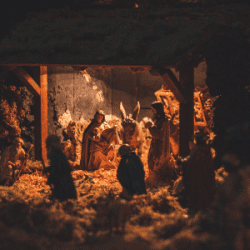Lectionary Reflections
Exodus 3:1-15
August 28, 2011
On occasion, the lectionary throws up a passage that has become nothing less than clichéd in the modern world. Exodus 3:1-15 is just such a passage. Here we find the famous burning bush and Moses' confrontation with it. I must add that I think the older movie portrayal of this scene has had a very strong effect on the way it has been perceived and appropriated. That Cecil B. DeMille production from the 1950s, starring Charlton Heston, has fixed in more than a few American minds just what Moses must have looked like and just how he must have acted in the presence of the blazing bush. Such is the power of the movies to override any other possible hearing of the biblical text. Here is a case, however, where the movie gets it almost completely wrong.
Even a cursory reading of Exodus 3:1-15 suggests that we are not so much in the world of holy and mysterious confrontations with the numinous as we are in the world of farce. To be sure, talking and blazing bushes are hardly the stuff of the everyday, but Moses, when confronted by the amazing sight, does not stare in stupefied religious silence but has a series of quite extraordinary things to say to the shrub, after the leafy plant commands him to act. In short, Moses is far less Charlton Heston here than he is Woody Allen. Let us now see why I might make such an outlandish claim.
The scene at the bush is bracketed by Moses' life circumstance. He has escaped the fury of the Egyptian pharaoh, his adoptive grandfather, after the murder of the Egyptian overseer who was abusing an Israelite (Ex. 2:14-15). Moses runs for his life to Midian, a tiny tribal community in the southern deserts on the east side of the Dead Sea. There he meets his bride, Zipporah ("Little bird" in Hebrew). They very quickly have a son whom Moses names Gershom, meaning "Stranger (or 'sojourner') there." Such a name suggests that however much Moses thinks he has found a place to live for the remainder of his life, that may prove not to be true after all. He soon finds work in the shepherding business of his father-in-law, Jethro (called Hobab in another tradition of the story).
In the course of time, Moses pastures his flock "beyond the wilderness," that is in a very spooky and distant place indeed, far from the known haunts of his world, and comes to "Horeb (called Sinai in another tradition of the story), the mountain of God." And it is there that he spies the famous burning bush, a bush afire but not burned up. And if that were not enough, the bush starts talking!
"Moses, Moses," intones the bush, and Moses responds in an appropriate ancient Middle Eastern way, "Here I am." The bush goes on to demand proper deference to its wonder, insisting that Moses take off his sandals, "because where you are standing is holy ground" (Ex. 3:5). Then the bush reveals itself as nothing other than the receptacle of YHWH who is revealed familiarly as "God of your father, the God of Abraham, the God of Isaac, and the God of Jacob." And Moses, being nobody's fool, "hid his face, for he was afraid to look at God" (Ex. 3:6). So far, so good. Here we have a theophany, an appearance of God that calls forth proper fear and awe. Moses so far has responded as he ought to have.
YHWH proceeds to announce the reason for this particular theophany to this particular man at this particular time. "I have observed the misery of my people who are in Egypt; and I have heard their cry on account of their taskmasters. Indeed, I know their sufferings, and I have come down to deliver them from the Egyptians, and to bring them up out of that land to a good and broad land, a land flowing with milk and honey, to the country of the . . ." (Ex 3:7-8). YHWH now lists all of those people who currently reside in this land of promise, and reiterates yet again that the Hebrews' cries of anguish have been heard and that YHWH is fully aware of just how cruelly "the Egyptians oppress them" (Ex. 3:9).
I often picture Moses at this point, face down in the sand in front of the bush, listening to this mighty announcement of YHWH about oppression and YHWH's decision to act against it on behalf of Israel, and noting an important fact: every pronoun has been a first person one. It is obviously YHWH who has made the decision to intervene in the world for Israel and Moses is surely thinking, "I am behind you YHWH, way behind you." But unfortunately for Moses, the pronouns take an abrupt turn in verse 10. "So, come, I will send you to pharaoh to bring my people, the Israelites, out of Egypt."





